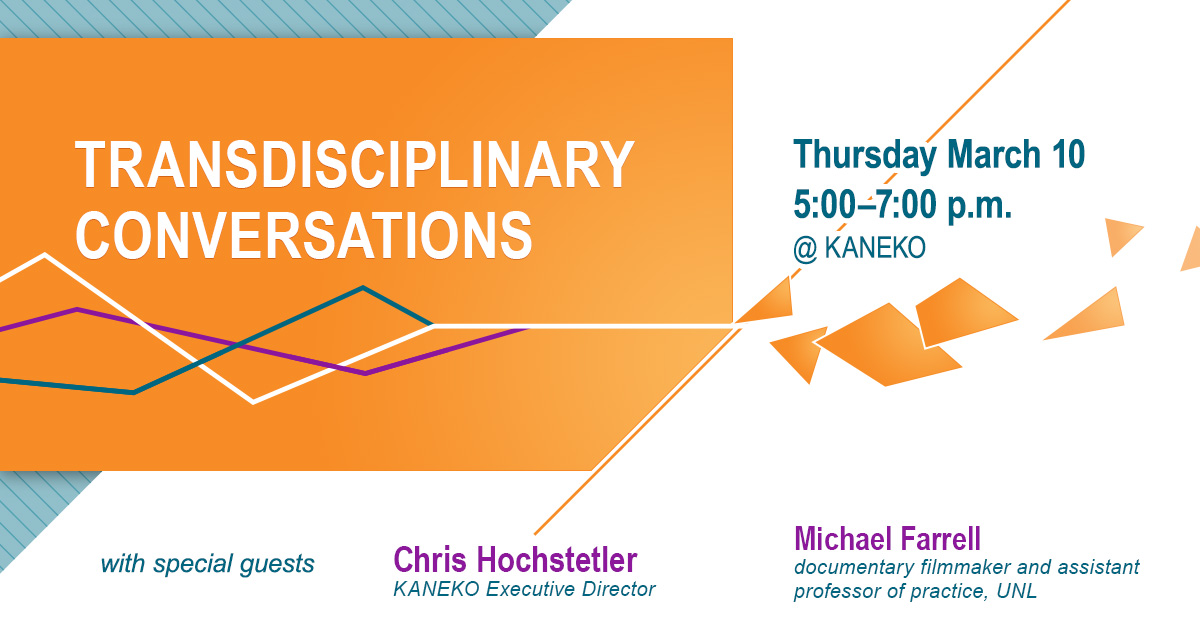
The Robert B. Daugherty Water for Food Institute (WFI) at the University of Nebraska will host a Transdisciplinary Conversations event Thursday, March 10, from 5 – 7 p.m. at KANEKO (1111 Jones St., Omaha, Neb.) in conjunction with the museum’s new exhibit examining water. Through a mix of science and fine art, “WATER” highlights some of the creative solutions being developed to address complex issues such as water quality, water quantity and sustainability of water for food, from local to global scales. The exhibit also illustrates the transdisciplinary nature of water with collaborations between artists, researchers, nonprofits and private industry.
KANEKO Executive Director Chris Hochstetler and WFI Director of Public Relations Molly Nance will share opening remarks at 6 p.m., followed by an informal talk by Water for Food Institute Faculty Fellow Michael Farrell, renowned documentary filmmaker and assistant professor of practice in the University of Nebraska-Lincoln’s Department of Agricultural Leadership, Education & Communication. Farrell’s work on the Platte Basin Timelapse project is featured in the exhibit. The remainder of the time will allow participants to network, exchange ideas and immerse themselves in the building-wide exhibit.
The event is free and open to all NU faculty, staff and students, as well as interested colleagues and community members in the private and nonprofit sectors. Light food and drinks will be served by Upstream Catering. KANEKO does not offer public parking; however, there are meters and paid parking lots available within walking distance. Please register by March 3: http://wfiglobal.org/YNF6g
The Water for Food Institute’s staff and Faculty Fellows participated in the exhibit in a number of ways. The institute’s staff contributed Warhol-esque images of water evapotranspiration and audio-visual displays of groundwater depletion in various locations around the world, from Kansas to India. WFI and KANEKO co-commissioned a large center-pivot installation by artist Matthew Dehaemers. Farrell and internationally acclaimed wildlife photographer Michael Forsberg provided video from the Platte Basin Timelapse project that demonstrates a watershed in motion. Hydrogeophysicist Trenton Franz’s high-tech cosmic-ray device that detects soil moisture to help improve irrigation efficiency is also featured.
To learn more about the “WATER” exhibit, which runs through April 23, visit thekaneko.org/water. For questions regarding the Transdisciplinary Conversations event series, contact Dana Ludvik at (+1) 402.472.9510 or dludvik@nebraska.edu.
About Transdisciplinary Conversations
The University of Nebraska has invested in four interdisciplinary institutes — Buffett Early Childhood Institute, National Strategic Research Institute, Rural Futures Institute and the Water for Food Institute — that leverage talent and research-based expertise from across the four-campus system to focus on complex state, national and global challenges. These institutes are partnering to host an event series designed to foster collaboration and new directions in transdisciplinary research. “Transdisciplinary Conversations” provides an opportunity for researchers, students, practitioners, educators, business leaders, policymakers, farmers and other community partners from across disciplines, campuses and geographic regions to gather informally to discuss important topics and make meaningful connections.
The Robert B. Daugherty Water for Food Institute at the University of Nebraska was founded in 2010 to address the global challenge of achieving food security with less pressure on water resources through improved management of water in agricultural and food systems. We are committed to ensuring a water and food secure world without compromising the use of water for other human and environmental needs. Learn more at: http://waterforfood.nebraska.edu/.
More details at: http://go.unl.edu/k4c9